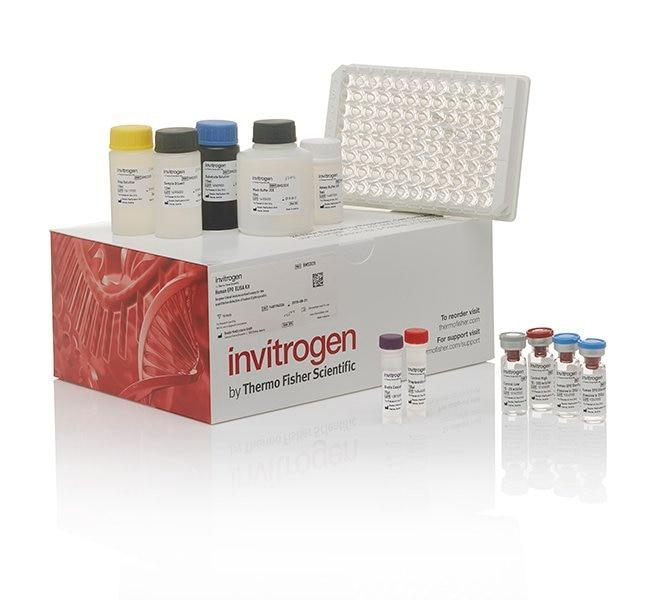Search Thermo Fisher Scientific
Product Specifications
Analytical sensitivity
Assay range
Sample type/volume
Hands-on time
Time-to-result
Homogenous (no wash)
Interassay CV
Intraassay CV
Instrument
Product size
Contents
Standard
Assay Diluent concentrate
Biotinylated Detection Antibody
SAV-HRP
Wash Buffer
Chromogen
Stop Solution
Adhesive Plate Covers
Shipping conditions
Storage
Protein name
Protein family
Species (tested)
Assay kit format
Detector antibody conjugate
Label or dye
About This Kit
The Mouse M-CSF (CSF1) ELISA quantitates Ms M-CSF in mouse serum, plasma, or cell culture medium. The assay will exclusively recognize both natural and recombinant Ms M-CSF.
Principle of the method
The Mouse M-CSF solid-phase sandwich ELISA (enzyme-linked immunosorbent assay) is designed to measure the amount of the target bound between a matched antibody pair. A target-specific antibody has been pre-coated in the wells of the supplied microplate. Samples, standards, or controls are then added into these wells and bind to the immobilized (capture) antibody. The sandwich is formed by the addition of the second (detector) antibody, a substrate solution is added that reacts with the enzyme-antibody-target complex to produce measurable signal. The intensity of this signal is directly proportional to the concentration of target present in the original specimen.
Rigorous validation
Each manufactured lot of this ELISA kit is quality tested for criteria such as sensitivity, specificity, precision, and lot-to-lot consistency. See manual for more information on validation.
M-CSF (Macrophage colony-stimulating factor, CSF-1) is a survival factor essential for the proliferation and development of monocytes, macrophages, and osteoclast progenitor cells. M-CSF also induces VEGF (vascular endothelial growth factor) secretion by macrophages, thereby mediating mobilization of endothelial progenitor cells and neovascularization. M-CSF is present as several bioactive isoforms that differ in potency and stability. The full-length protein is synthesized as a membrane-spanning protein that can be expressed on the cell surface or further cleaved and modified in the secretory vesicle. Further, M-CSF is a disulfide-bonded homodimer which is processed into one of two isoforms, a glycoprotein or a proteoglycan that has been modified by the addition of chondroitin sulfate to each subunit. Binding of M-CSF to its receptor, c-Fms (CSF-1R or CD115) induces dimerization of the receptor followed by internalization and degradation of the complex. Functionally, M-CSF is known to stimulate differentiation of hematopoietic stem cells to monocyte-macrophage cell populations in culture. M-CSF acts through the CSF receptor 1. Although human M-CSF shows activity on mouse cells, mouse CSF shows no activity on human cells.
For Research Use Only. Not for use in diagnostic procedures. Not for resale without express authorization.
Bioinformatics
Gene aliases : C87615, Csf1, Csfm, MCSF, op
Gene ID : (Mouse) 12977
Gene symbol : Csf1
Protein Aliases : CSF-1, MCSF, Macrophage colony-stimulating factor 1, osteopetrosis, PG-M-CSF, Proteoglycan macrophage colony-stimulating factor
UniProt ID (Mouse) P07141

Performance Guarantee
If an Invitrogen™ antibody doesn't perform as described on our website or datasheet,we'll replace the product at no cost to you, or provide you with a credit for a future purchase.*
Learn more
We're here to help
Get expert recommendations for common problems or connect directly with an on staff expert for technical assistance related to applications, equipment and general product use.
Contact tech support

